Key takeaways:
- Trivia games engage players in various subjects, encouraging social bonding and friendly competition.
- They enhance cognitive skills, boost confidence, and foster a love for learning through fun and interactive experiences.
- Incorporating trivia into learning can ease educational anxiety and promote teamwork and critical thinking, especially among kids.
- Trivia games about crypto can make complex concepts accessible and spark deeper conversations about digital currencies and online safety.
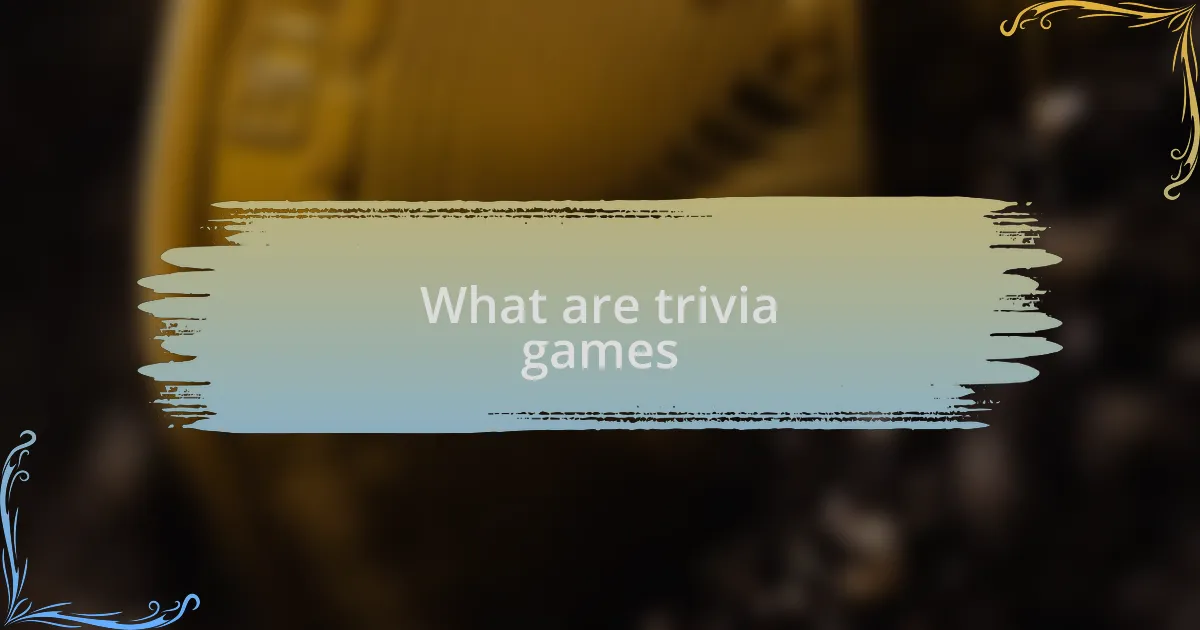
What are trivia games
Trivia games are interactive quizzes that test players’ knowledge on various subjects, from history to pop culture. I remember the first time I participated in a trivia night; the thrill of racing against the clock made each question feel like a mini adventure. How often do we get to challenge ourselves while having fun with friends in friendly competition?
These games often come in different formats, such as board games, mobile apps, and live events, allowing for flexibility in how we play. I once downloaded a trivia app, and it quickly became my favorite way to unwind after a long day. It’s fascinating how a simple game can spark curiosity and lead to discovering new interests.
What really makes trivia games special is their ability to bring people together. I love the laughter and debate that ensue when friends can’t agree on answers. Isn’t it amazing how a game can create such moments of connection and shared knowledge?
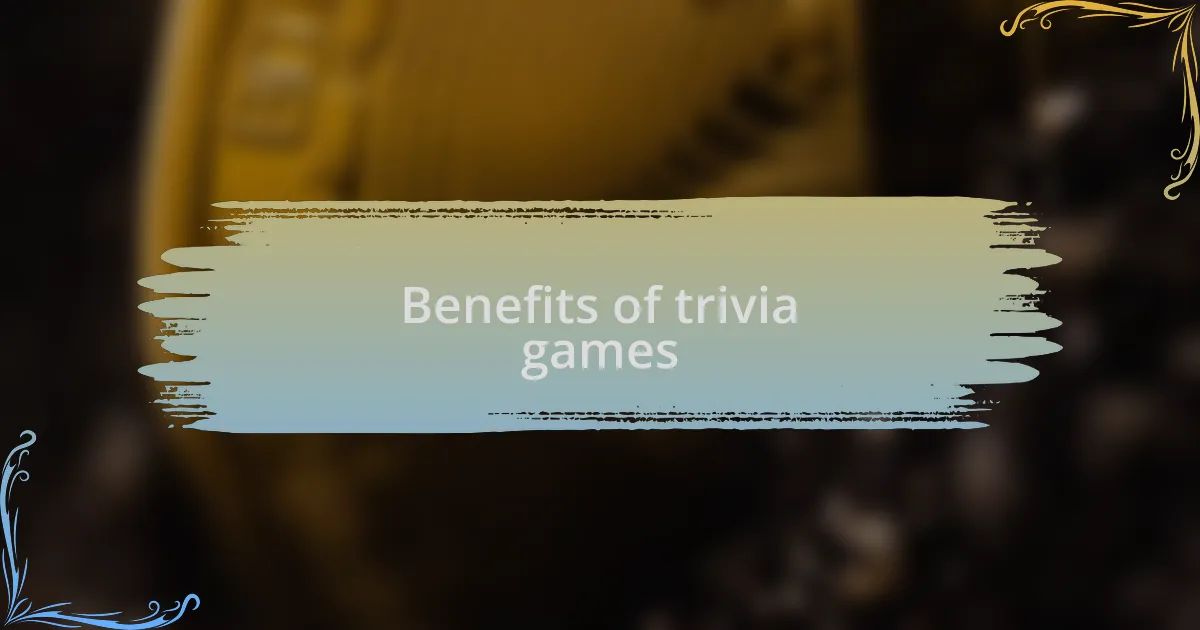
Benefits of trivia games
Engaging in trivia games offers numerous cognitive benefits. I’ve noticed that each round requires quick thinking and recall, which can sharpen memory and improve problem-solving skills. Don’t you feel a rush of excitement when you answer a tough question correctly? That moment of triumph can boost confidence, showing just how powerful our brains can be.
Beyond enhancing cognitive function, trivia games are fantastic for social bonding. I remember one particular trivia night where my team struggled through tough questions, but in the end, our shared victory felt like a celebration of our collaboration. How often do we find joy in teamwork through something as simple as a game? It’s incredible how trivia can transform casual gatherings into memorable experiences.
Lastly, trivia games often spark a love for learning. I’ve often found myself diving deeper into topics just because they came up during a game. Wouldn’t it be great if kids could develop a passion for knowledge through play? The interplay of fun and education makes trivia an effective tool for nurturing curiosity, making every game not just a challenge, but an opportunity for exploration.
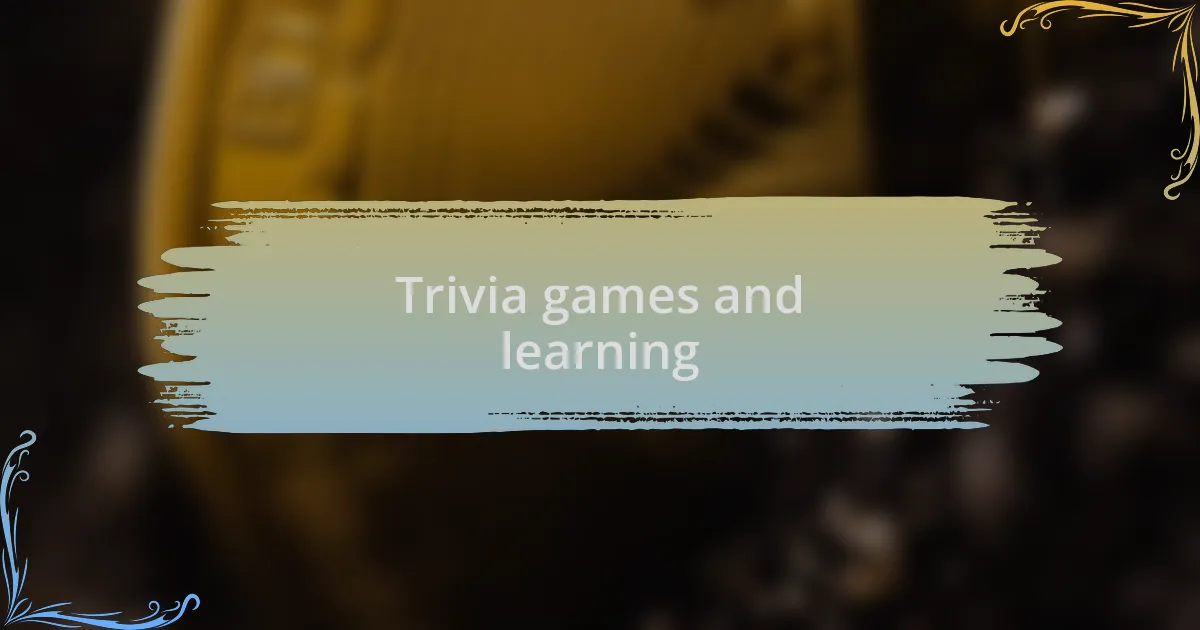
Trivia games and learning
Trivia games create a unique environment for learning, encouraging exploration in a fun way. I vividly recall a trivia night where a question about ancient history sparked my curiosity. I left eager to dive into books and documentaries to learn more. Isn’t it fascinating how a simple question can lead to a whole new world of knowledge?
Moreover, the fast-paced nature of trivia challenges players to think on their feet. I remember a time when I struggled with a question about famous inventors, but with a little pressure, I recalled vital information. This immediate recall exercise not only reinforces memory but makes learning feel less like a chore and more like an adventure. Who wouldn’t want to learn while having fun in a competitive setting?
Incorporating trivia into learning can also ease anxiety around education. I’ve seen kids light up when they answer correctly, turning nerves into excitement. Doesn’t it feel great to learn through games? This approach ensures that learning becomes a joyous journey, paving the way for lifelong curiosity and knowledge retention.
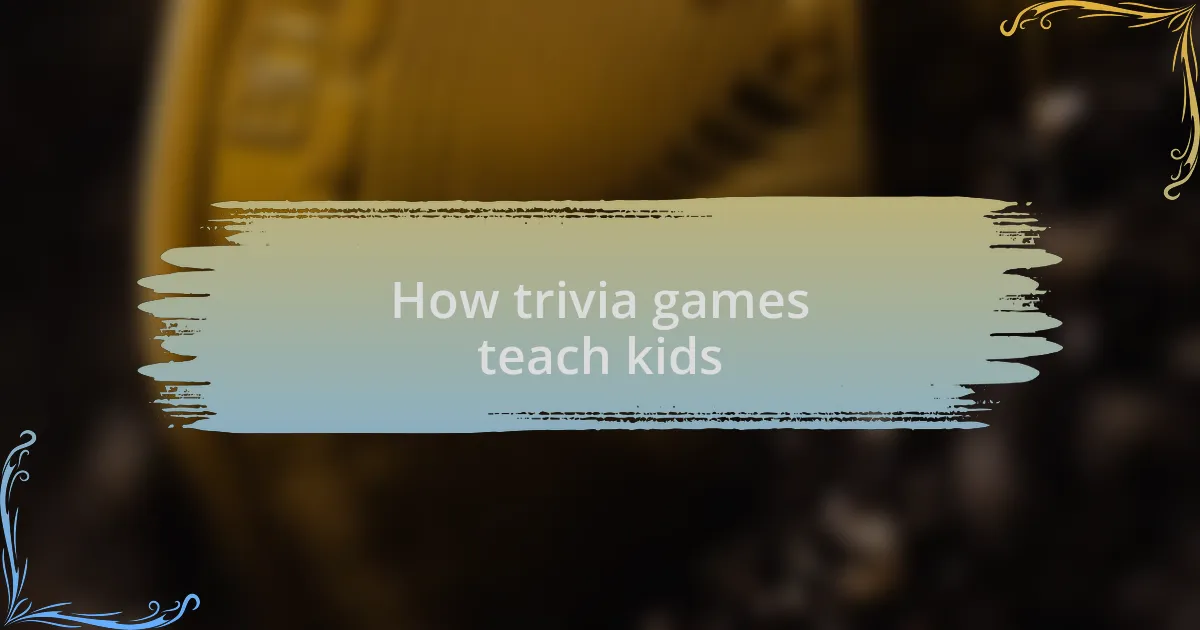
How trivia games teach kids
Trivia games teach kids not only facts but also critical thinking skills. I remember a time when a trivia question puzzled my friends and me, prompting us to discuss possible answers. That lively debate opened pathways to learning about different topics, showing me that enthusiastic conversation can lead to deeper understanding. Isn’t it interesting how a little competition can inspire teamwork and discussion?
As kids engage in trivia, they develop a sense of accomplishment when they answer correctly. I saw this firsthand at a family game night; my niece nearly jumped out of her seat when she got a tough question right. That moment of victory not only boosted her confidence but also made her excited to learn more for the next game. Can you recall the thrill of mastering a new topic? It’s moments like these that create lasting impressions.
Furthermore, trivia games teach kids the importance of persistence. I have seen my son become frustrated when he doesn’t know an answer, but he always tries again. This resilience, built through repeated attempts and occasional failures in trivia games, equips him with a valuable life skill: the ability to bounce back and keep learning. Isn’t that an important lesson for the challenges they will face in the future?
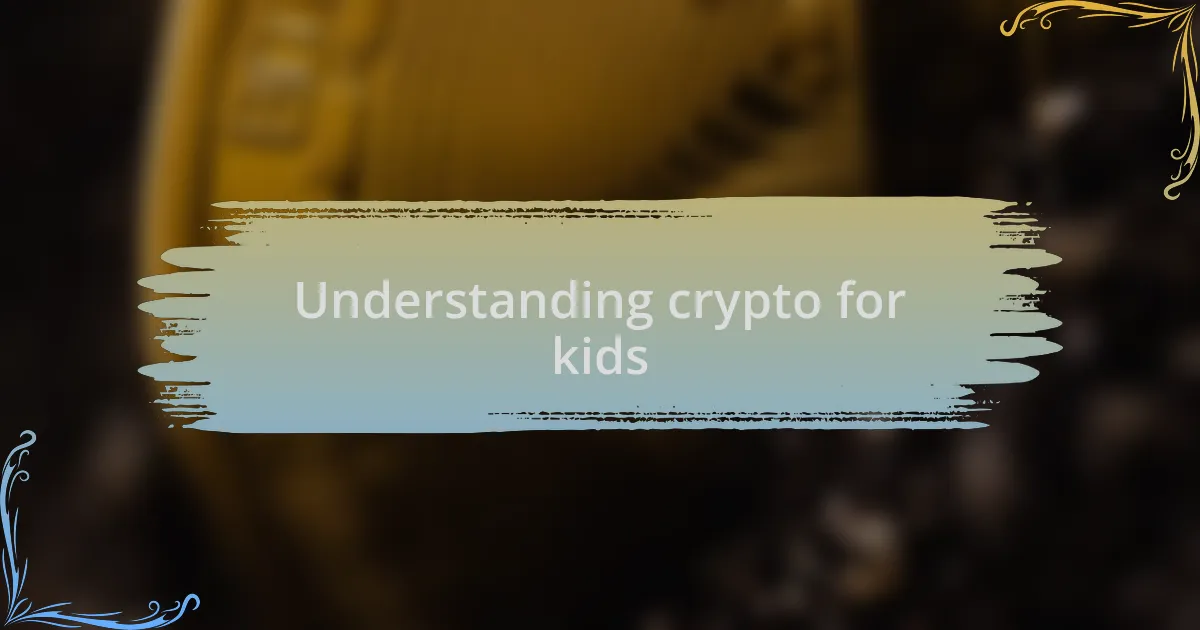
Understanding crypto for kids
Understanding crypto can seem daunting for kids, but breaking it down into simple concepts makes it engaging. When I first introduced my daughter to the idea of digital currencies, I compared it to the virtual coins she collects in video games. She found it fascinating that those coins could have real-world value, sparking her curiosity about how money works in our digital age.
To grasp crypto, it’s essential to explain the concept of blockchain, which is like a digital ledger recording transactions. I often liken it to a public library where everyone can see which books are borrowed and returned, promoting transparency. This analogy clicked for my son when I shared how every transaction with crypto is recorded and cannot be changed—making the system secure and reliable.
Additionally, I believe kids should learn about the importance of online safety and responsible spending when dealing with crypto. I remember the conversation I had with my son after he heard about a major hack in the news—it opened the door for a broader dialogue about protecting personal information. Helping children understand these aspects empowers them to navigate the digital financial world more confidently, doesn’t it?
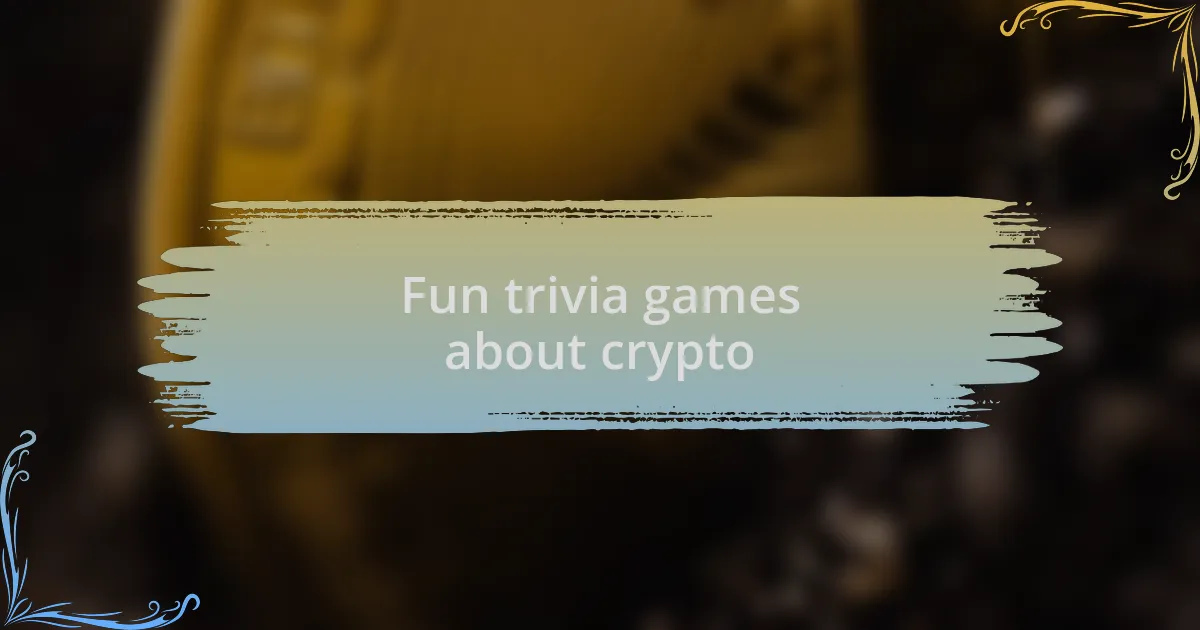
Fun trivia games about crypto
I’ve discovered that trivia games tailored around crypto can transform learning into an exciting adventure. For instance, when I played a trivia game with my kids, we challenged each other on questions about Bitcoin and Ethereum. Their excitement when they answered correctly was palpable; it was a joy to see their confidence build with each right guess.
One memorable trivia session sparked heated debates about the origin of various cryptocurrencies. I remember my daughter confidently stating that Dogecoin started as a joke, and when I asked her why that matters, I could see the gears turning in her mind. It was in that moment, amidst laughter and playful banter, that I realized trivia could serve as a springboard for deeper conversations about the real-world implications of these digital currencies.
Incorporating a mix of fun facts and surprising trivia engages kids and makes the intricacies of crypto seem less intimidating. When my son learned that some people have become millionaires through investing in crypto, his eyes widened in disbelief. I used that moment to dive into discussions about risk and reward, helping him understand that while crypto is fascinating, it’s vital to approach it with caution and informed curiosity.
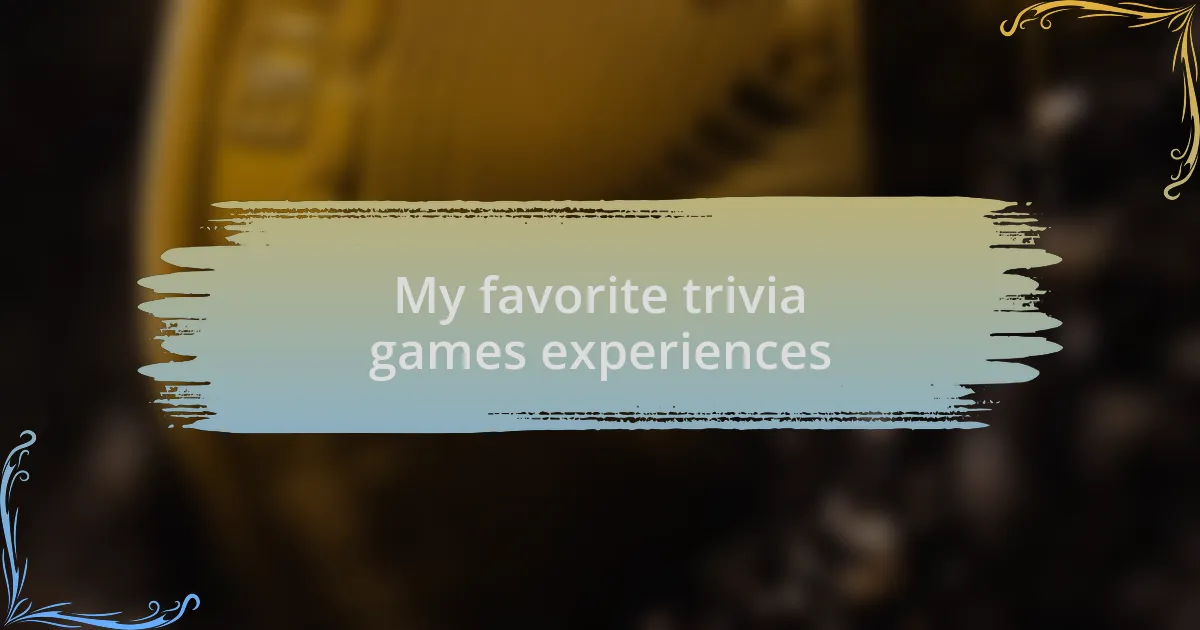
My favorite trivia games experiences
I remember one particular trivia night where we pitted our knowledge against each other in a friendly family competition. We set up a scoreboard to track our scores, and the tension in the room was palpable as each question was asked. It was such a thrill when my youngest surprised us all by knowing how many different cryptocurrencies exist; the look on their face when they got it right was priceless!
Another favorite moment was during a game themed around crypto history. I vividly recall my son jumping out of his chair when he answered correctly about Satoshi Nakamoto’s pseudonym. His excitement turned into a mini-lecture on who Satoshi might be, which had everyone laughing but also led us into a deeper discussion about identity and anonymity in the digital age. Questions like, “What if Satoshi is someone we know?” really got everyone thinking!
Lastly, I cherish those moments that turned into teachable experiences without feeling too formal. One game asked about the environmental impact of crypto mining, and I couldn’t help but engage my kids with a question about what we could do to promote sustainability. Hearing their ideas not only made me proud but also showed me that trivia can spark important conversations about topics that matter. How cool is it that a game can bridge the gap between fun and serious discussions?